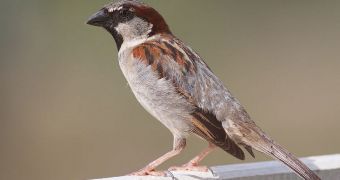Many bird species spend their summers and winters in different places on the planet. There are many reasons for this type of behavior, but the most common is related to temperature variations. Birds remain for instance in temperate areas during the summer, but them fly to warmer areas when winter sets in. In a recently-published study, researchers at the University of Wisconsin-Madison (UWM), in the United States, say that some birds, including sparrows, become hyperactive during migrations.
The team determined in laboratory-based experiments that the sparrows were a lot less capable of controlling their response to temptation during the spring and fall migratory seasons. The researchers focused their attention on the white-crowned sparrow, investigating the way the birds of this species slept and controlled their behaviors during this period of migration. Details of the research were published in the latest issue of the respected open-access journal BMC Neuroscience.
The investigators placed a button in the birds' cages that, once pressed, would provide food. They then looked at how much the birds slept, and at how often they used the switch. “In the wild, despite marked reductions in apparent opportunity to sleep, birds continue to successfully engage in prolonged flight, complex navigation and predator evasion during migration. In the laboratory, we’ve previously found that birds in the migratory state can learn to peck at a switch for food as well as birds during non-migratory periods. In contrast, in this study we demonstrate that, relative to birds in the non-migratory state, they struggle to learn when not to peck,” says the director of the study, expert Ruth Benca.
“It is conceivable that the temporal fragmentation of migratory sleep plays a role in the migration-specific loss of behavioral inhibition. Whether the inability to inhibit pecking is related to a general failure of inhibition, a distorted sense of time, inattention to salient cues, or some other underlying mechanism is not entirely clear,” the expert adds. She says that the increased amount of impulsivity the team noticed in the birds was not directly correlated to the fact that the animals slept for shorter periods of time in the summer, AlphaGalileo reports.

 14 DAY TRIAL //
14 DAY TRIAL //